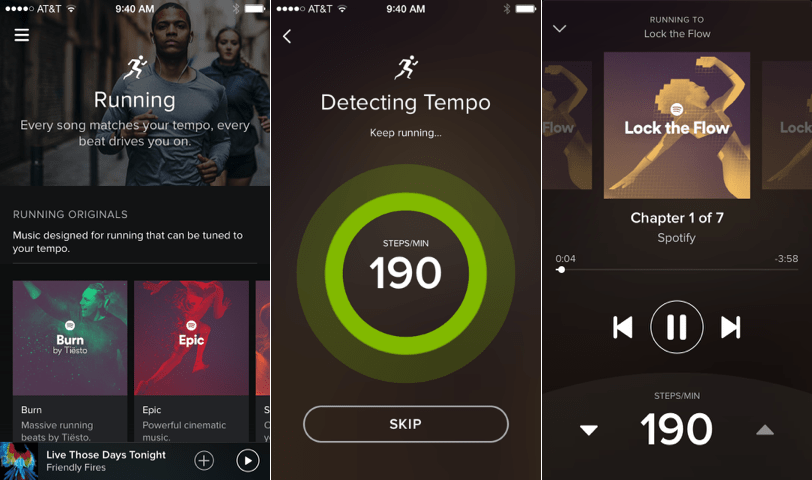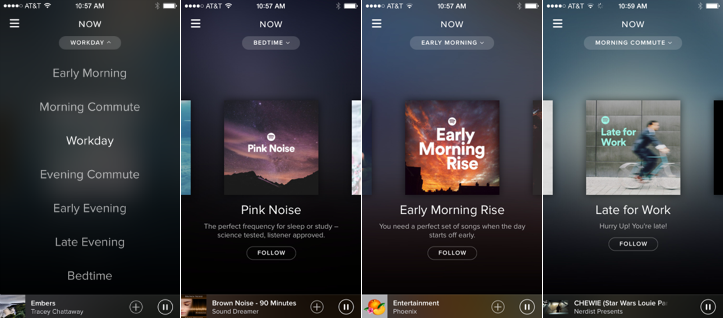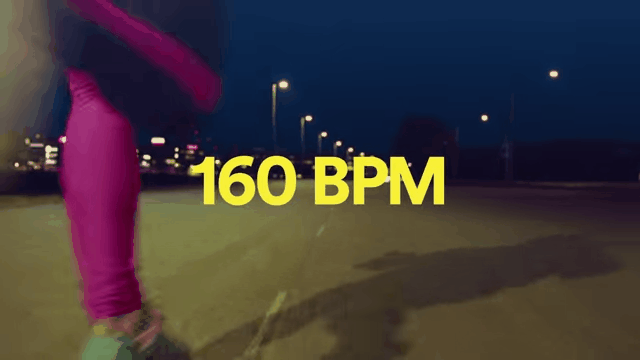Running is big business. There are shoes, clothes, fitness trackers, apps and countless other products that promise to make us faster — or at least distract us from our pain. For me, music is the only thing that’s ever worked. So when Spotify announced a way to “change the way you run forever,” I leapt at the chance. More accurately, I ran.
This is Spotify Running. Open up your Spotify app today, tap “Running”, and you’ll find a slick new home screen with several specially-made playlists. These aren’t collections of songs, exactly — they’re DJ-built instrumental mixes, organised into “moods” like Epic (which sounds like you’re running from the KGB), Blissed Out (sounds like you’re running in a bank commercial), and a Tiesto-branded mix (sounds like you’re running away from an EDM rave).
I was very sceptical that an algorithm would know exactly how to coerce my brain into not stopping, but eventually settled on “Lock the Flow”, described as “shimmering electronic beats”. A woman’s voice asked me to start running, and using movement data from my phone’s accelerometer, settled on a steps-per-minute rate — around 170.
The mix was great, actually: It had the momentum and contrasts to kept me going for a mile or so, until my mind started to wander. Stop running, my brain whispered to me.
Why music helps us run

Like many runners, I need music to push myself through the misery. Loud music. Really loud. It feels like it alters my brain chemistry to distract me from the lactic goo accumulating in my muscles. In fact, there’s been some recent research that supports that observation, as Scientific American explains.
“An ergogenic effect is evident when music improves exercise performance by either delaying fatigue or increasing work capacity,” wrote researcher Costas Karageorghis in 2012. “In this sense, music can be thought of as a type of legal performance-enhancing drug.” At the same time, plenty of people say relying on music to work out is an insipid form of wussing out.
When I was using Spotify Running, I didn’t run for longer than I normally would. But I did find myself fixating less on what I was doing. When I got home after one run, I decided to try the app out with another form of cardio that can feel like drudgery, but that I enjoy much more: I hopped on my trainer bike.
By setting the app’s tempo myself, I realised could pair the songs to keep my cadence up. Some of the pop hits Spotify played for me were awful, some were great. But the time went by remarkably quickly.
Below Spotify’s mixes, I found a “Recommended For You” playlist, which pulls suggestions from your listening history. This is what Spotify’s algorithm “thinks” you like to listen to while running — which seemed to correspond roughly with the music I already use. I heard songs I’d listened to again and again, in a different order and with a few wildcards thrown in.
There are oddities, too — repeated songs by bands I’ve barely listened to since college, followed by roughly six Jay-Z songs in a row. It kept suggesting someone named Olly Murs, who I now know was a contestant on the show X-Factor in 2009. But a lot of the time the suggestions were fun, if a bit weirdly strung together. One nice touch: The app edits each song to skip any long intros and outros that bring down the tempo.
Should you try it?

Yes, the bedtime channel suggested a track called Brown Noise.
The road to becoming faster, and fitter, is long. It’s boring. Little moments where you can see how you’re improving are extremely rare, as Ta-Nehisi Coates recently pointed out in a fantastic essay, saying “There is absolutely nothing in this world like the feeling of sucking at something and then improving at it.” The smart thing about Spotify Running is also the thing that people often overlook about silly fitness tracking apps and gadgets: They create tiny moments of delight and distraction along that long, slow, boring road.
Running is just one aspect of a major new Spotify update called Now. This new menu on the app is a list of Spotify-built playlists that are curated based on time of day and activity. There’s a bedtime library with playlists like Pink Noise and Cloud 9. A “morning commute” library has playlists like Late For Work and TGIF.
These playlists have existed for a while, but now Spotify is targeting them more pointedly, suggesting songs based on what you’re probably up to at the moment. This type of machine learning isn’t unique to the company (Aether, for example, is doing the same thing) but Spotify has a leg up on its competitors based on its massive user base and even bigger music library. It wants to be your contextual, machine-taught DJ. Running could be its trojan horse.
Spotify’s algorithm cannot make you a better athlete. It may not “change the way you run forever.” But it could go a long way towards distracting you while you push yourself — whether it’s another long hour on your bike or another slow mile on the footpath.
